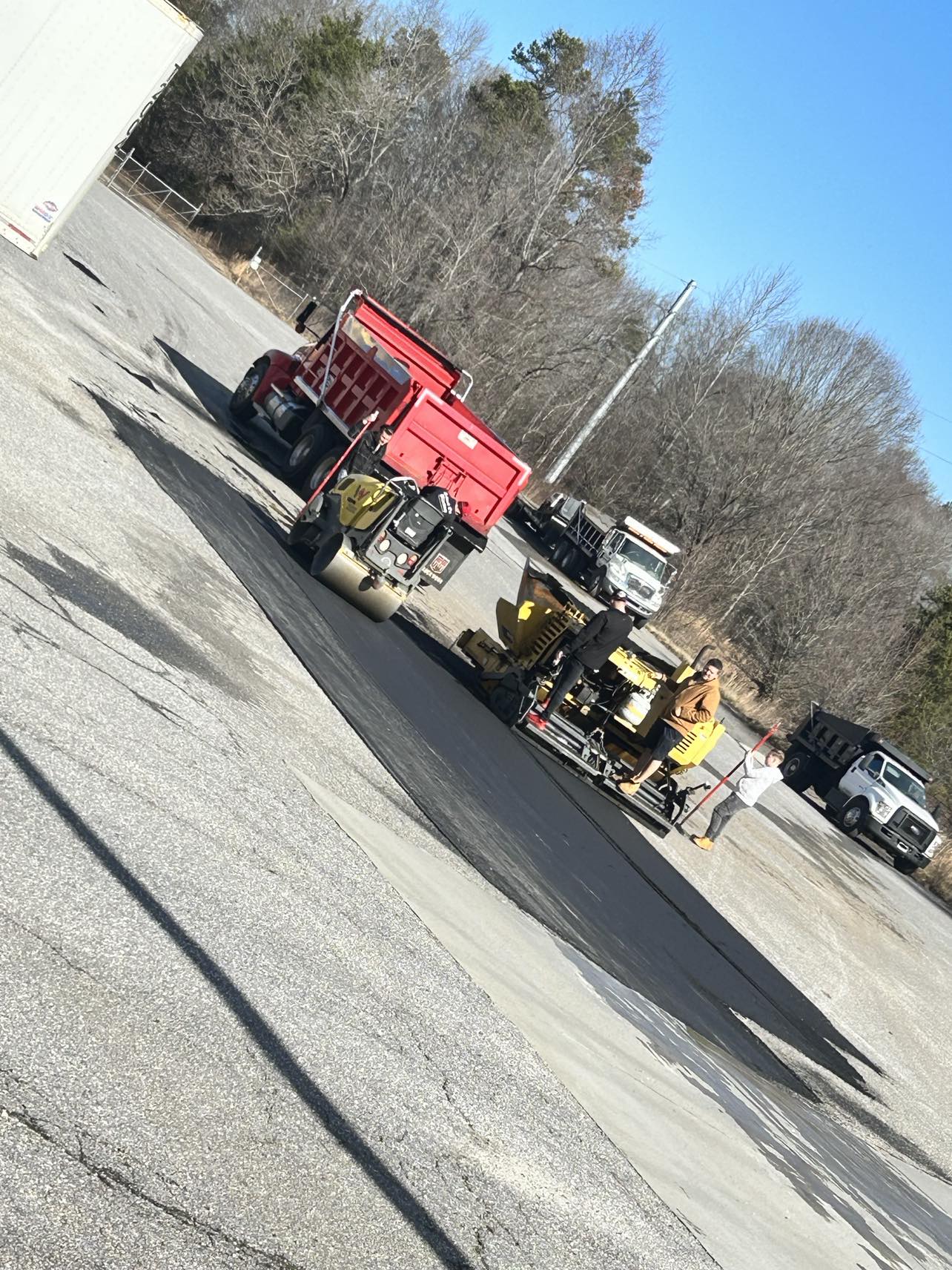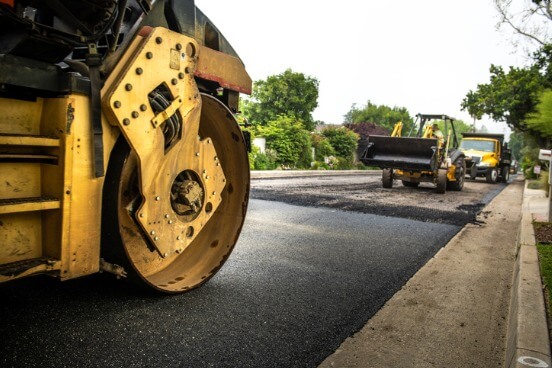Exploring the Different Sorts Of Asphalt Paving and Their Advantages
The landscape of asphalt paving includes a range of types, each crafted to address certain needs and ecological factors to consider. From the durable characteristics of Hot Mix Asphalt to the eco-friendly qualities of Recycled Asphalt Pavement, comprehending these choices can significantly affect job results. Developments such as Cozy Mix Asphalt and Porous Asphalt present extra layers of performance and sustainability. As we check out these various paving services, the nuanced benefits they provide might surprise you and potentially modify your strategy to future paving tasks.
Hot Mix Asphalt
When thinking about one of the most reliable leading remedies, warm mix asphalt (HMA) stands apart as a premier option for numerous applications (paving). HMA is a flexible paving product known for its durability, flexibility, and total efficiency. It is produced by home heating asphalt binder and combining it with accumulations at high temperatures, ensuring an uniform blend that can stand up to different ecological problems
Among the key benefits of HMA is its ability to supply a smooth, skid-resistant surface area, improving safety and security for automobiles and pedestrians alike. In addition, HMA shows superb resistance to deformation, making it ideal for high-traffic areas such as highways and car park. Its flexibility to different climates better adds to its prevalent use.
The installation process of HMA is fairly quick, permitting effective task completion with marginal disturbance to traffic. Moreover, it can be recycled, reducing waste and promoting sustainability within the building industry. On the whole, warm mix asphalt continues to be a top option for paving experts as a result of its robust efficiency characteristics and long-term cost-effectiveness, making it a reputable remedy for different framework demands
Cozy Mix Asphalt
Warm mix asphalt (WMA) offers an innovative choice to warm mix asphalt, offering similar advantages while calling for lower production temperature levels. Generally generated at temperatures between 190 ° F and 250 ° F, WMA modern technology reduces power intake and greenhouse gas exhausts during production, making it an extra ecologically pleasant choice.
Among the crucial benefits of WMA is its prolonged workability period. The lower temperature levels allow for extra efficient transport and placement, particularly in cooler weather problems. This versatility can result in improved compaction and general sturdiness of the asphalt surface. In addition, WMA can be utilized in different applications, varying from highways to residential driveways, without endangering performance.

The incorporation of additives or changed binders in WMA adds to its boosted buildings, making certain that it meets or exceeds performance requirements. WMA's reduced thermal impact during manufacturing can decrease the possibility of damages to the surrounding setting, making it an enticing choice for sustainable look these up paving techniques.
Cold Mix Asphalt
Cold mix asphalt is a versatile paving solution commonly used for momentary fixings and low-traffic areas. This kind of asphalt is generated at ambient temperature levels, making it a convenient choice for quick fixes and jobs where standard warm mix asphalt might not be practical. The combination usually includes asphalt binder, accumulation, and ingredients, permitting it to continue to be workable for a prolonged period.
One of the primary benefits of cold mix asphalt is its convenience of application. It can be set up without customized tools, making it easily accessible for smaller professionals and do it yourself enthusiasts. Additionally, cold mix can be applied in numerous weather, which is particularly beneficial for immediate repair work demands.

Cold mix asphalt is additionally cost-effective, as it permits budget-friendly repairs without sacrificing quality. Its adaptability makes it appropriate for covering fractures, filling up fractures, and resurfacing driveways. It may not provide the same long-lasting resilience as hot mix asphalt, its fast application and flexibility make it an outstanding choice for momentary remedies and low-traffic applications. In general, chilly mix asphalt stays a useful alternative in the asphalt paving landscape.
(start now)
Permeable Asphalt
Permeable asphalt is an innovative paving remedy designed to enhance stormwater management and lower surface area overflow. This type of asphalt includes a special structure that includes interconnected gaps, enabling water to permeate through the surface and into the underlying layers. By promoting natural drainage, porous asphalt assists reduce the threat of flooding and decreases the worry on local stormwater systems.
Among the primary advantages of porous asphalt is its capability to boost water quality. As stormwater infiltrate the sidewalk, toxins and debris are entraped, lowering the variety of contaminants that go into neighborhood rivers. This adds to much healthier ecological communities and sustains compliance with environmental guidelines.
In addition, permeable asphalt can enhance the long life of the sidewalk itself. By lowering water buildup on the surface area, it lessens the potential for freeze-thaw cycles that can bring about breaking and wear and tear. Furthermore, the decreased requirement for typical stormwater monitoring facilities can result in price financial savings for districts and designers.
Recycled Asphalt Pavement
(click here)Recycled asphalt pavement (RAP) stands for a lasting approach to road construction and maintenance that profits both the setting and the economic climate. By reusing existing asphalt products, RAP lowers the need for new resources, which consequently preserves all-natural sources and minimizes environmental impact. This technique decreases power consumption and greenhouse gas emissions related to the manufacturing of brand-new asphalt.
The unification of RAP right into brand-new sidewalk combinations can also result in considerable cost savings. Professionals can take advantage of recycled products to decrease overall project expenses, making it an economically feasible choice for towns and personal developers alike. Furthermore, RAP provides comparable performance characteristics to virgin asphalt, making certain sturdiness and longevity in roadway surface areas.
RAP's flexibility allows it to be made use of in numerous applications, consisting of highways, car parking lots, and residential driveways. By boosting the architectural integrity of existing sidewalks, RAP adds to improved safety and security and level of smoothness of streets.
Conclusion
Finally, the diverse kinds of asphalt paving each offer distinctive benefits tailored to specific needs. Hot Mix Asphalt excels in durability and quick setup for high-traffic areas, while Cozy Mix Asphalt enhances sustainability via minimized energy intake. Cold Mix Asphalt acts as an economical alternative for urgent repairs, Porous Asphalt successfully manages stormwater, and Recycled Asphalt Sidewalk promotes ecological obligation. Collectively, these leading solutions add to efficient, eco-friendly methods in the construction market.